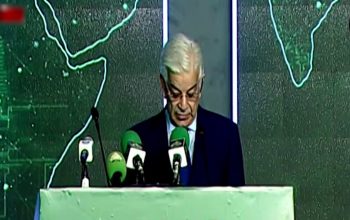ISLAMABAD: All Pakistan Textile Mills Association (APTMA) has presented innovative solution to reduce energy cost for the textile sector saying that power plants be dedicated for the industrial sector and wheeling of electricity under the recently introduced CTBCM regime sans cross-subsidy and stranded costs.
This suggestion was floated by APTMA to Power Division in a letter following a meeting between Finance Minister Ishaq Dar and APTMA.
APTMA has requested Power Division to take immediate and decisive action on the following proposal: revival of Regionally Competitive Energy Tariff (RCET); APTMA strongly emphasized the allocation of a reasonable portion of the budget to maintain the Regionally Competitive Energy Tariff (RCET).
Pakistan’s textile exports plunge in March: APTMA
Upholding the Commitment to a regionally competitive tariff for Export-Oriented Units (EOUs) at Rs 19.99/kWh for electricity and $9/MMBtu for gas/RLNG or formula of 50:50 irrespective of the date of gas connection is imperative to ensure the competitiveness of the textile sector in Punjab.
This allocation will effectively prevent the closure of textile businesses, sustain export orders, and mitigate the potential loss of $10 billion in annual exports. The total cost of regionally competitive energy tariff (RCET), if the differential is treated as the subsidy/cost is 2.67%.
APTMA brought to attention the precarious state of the textile sector following the withdrawal of RCET, saying that it is imperative to address the adverse impact of the current cross-subsidy system, which detrimentally affects industrial output, exports, and overall economic activities. Rather than extracting these subsidies from industries, alternative social protection schemes should be explored to fulfil socioeconomic obligations.
By eliminating the exploitation of industries and rectifying economic distortions resulting from the current tariff structure, a favourable environment can be created to foster industrial growth and development. APTMA emphasized that cross-subsidies, inefficiencies, taxes, etc., cannot be exported and that without correcting the basis of tariff, Pakistani products will no longer be competitive and will lead to closure.
Commenting on reasonable open access (wheeling) charges, APTMA contended that as emphasized during the meeting that subsidies cannot be provided while the IMF program is in effect, APTMA presented an innovative solution to reduce energy costs for industry notably by dedicating power plants for the industrial sector and wheeling of electricity under the recently introduced CTBCM regime.
However, the realization of this proposal necessitates the full support of the Finance Division through a directive to the Power Division that cross-subsidy and stranded costs should not form part of the open access charges as cross-subsidies and stranded costs cannot be exported. It was assured during the meeting that the government will facilitate the transition towards open access in the power sector, thereby ensuring a self-sustainable and competitive industry.
APTMA also noted that the issue of regionally competitive energy tariffs for export-oriented industries in LIEDA, FIEDMC, and Sundar Industrial Estates remains unresolved. The export units in these industrial areas despite being eligible companies have not received credit for the differential. During the meeting, Power Division was directed to quantify accumulated arrears, resulting from delays caused by the Power Division, and settle the industries’ rightful claims to defray these liabilities.
Copyright Business Recorder, 2023
Read the full story at the Business Recorder - Latest News website.



